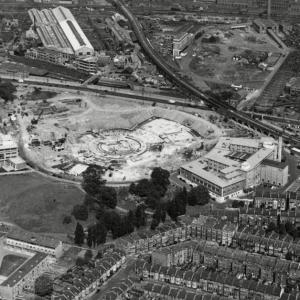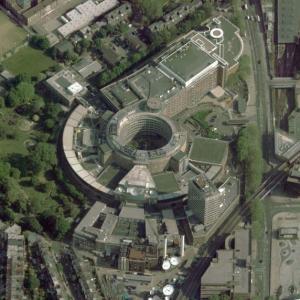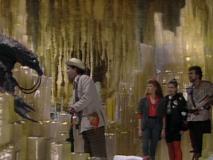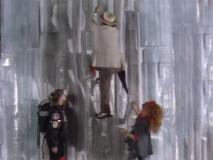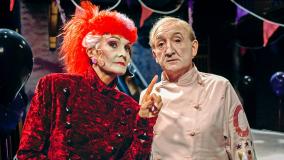Goodbye, Television Centre
Friday, 22 March 2013 - Reported by Chuck Foster
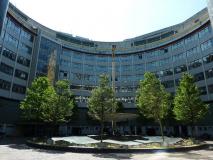 Tonight sees an evening celebrating the spiritual home of BBC Television, Television Centre at White City, London.
Tonight sees an evening celebrating the spiritual home of BBC Television, Television Centre at White City, London.The schedule will see what is expected to be the final programmes to be made at TVC, which closes at the end of the month after some 53 years of broadcasting. Events include an attempt to recreate the record-breaking tap dance originally made by Roy Castle in 1977, plus a live hour performance by band Madness on the Centre forecourt. The evening's centrepiece will be the broadcast of Goodbye, Television Centre, a 90 minute programme presented by a name well known to Doctor Who fandom, former BBC1 Controller and Chairman Michael Grade, and featuring a host of celebrities long-associated with broadcasting from TVC including Michael Parkinson, David Attenborough, David Jason, Penelope Keith and Ronnie Corbett. Finally, musician Richard Thompson performs a one-off concert from Studio 8.
- 7:00pm, BBC One, The One Show
- 7:30pm, BBC Four, Madness Live
- 8:30pm, BBC Four, Goodbye Television Centre
- 10:25pm, BBC Four, Richard Thompson BBC Four Session
For Doctor Who fans, TVC will also be remembered as the 'home' of the series during its initial production run. The first episode to be recorded here was The Warriors of Death in 1964, but it wasn't until the tail end of the Troughton era when it was to become the 'permanent' studio complex for recording (barring the occasional story). TVC itself became a location as the exterior of the World Ecology Bureau in The Seeds of Doom, and will feature prominently as its 1960s self in the 50th Anniversary drama An Adventure in Space and Time.
A brief history of TVC:
Although of interest to Doctor Who fans, who tend to have greater interest in the production history of their programme than more casual viewers, BBC Television Centre has transcended fandom of any kind to become a recognised icon of British popular culture. It is indelibly associated with BBC Television in the minds of many of the British public, even those who have no interest at all in the history of television or how it is produced.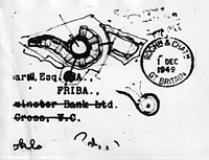 The land where Television Centre – always ‘TVC’ for short – now stands was originally part of the 1908 Franco-British Exhibition; it was purchased by the BBC in 1949, although construction did not begin until the 1950s. Its unique question-mark shaped design allegedly came from a flash of inspiration on the part of architect Graham Dawbarn, who was wrestling with how to fit the requisite number of studios and other buildings onto the triangular piece of land the BBC had bought. Popular legend says that he doodled the question mark shape onto an envelope, and this was how the problem was solved.
The land where Television Centre – always ‘TVC’ for short – now stands was originally part of the 1908 Franco-British Exhibition; it was purchased by the BBC in 1949, although construction did not begin until the 1950s. Its unique question-mark shaped design allegedly came from a flash of inspiration on the part of architect Graham Dawbarn, who was wrestling with how to fit the requisite number of studios and other buildings onto the triangular piece of land the BBC had bought. Popular legend says that he doodled the question mark shape onto an envelope, and this was how the problem was solved.Although designed as the first purpose-built television studio complex in the world, it took until 1960 for Television Centre to open, by which time Granada Television’s custom-built Quay Street studios in Manchester were already open and producing programmes. However, over the following decades, BBC Television Centre became undeniably the most famous television production centre in Britain, and perhaps one of the most famous in the world – to some British viewers it seemed, in the words of Steven Moffat in Doctor Who Confidential, “more Hollywood than Hollywood”.
From the centre’s official opening in 1960s up until the 1990s, the studios were home to every conceivable genre of television programming – drama, sitcom, light entertainment, discussion, news, current affairs, lifestyle, chat show and more. Television Centre was a broadcasting factory, pumping out the core of the BBC’s output, serviced by on-site production departments creating costumes, sets, special effects for every imaginable situation and setting on Earth – or of course, as Doctor Who fans know, beyond.
Television Centre was never the sole home of the BBC’s television output, even in London, but its frequent on-screen presence in many of the Corporation’s programmes meant it came to be seen as the home of BBC Television. However, into the 1990s the style and nature of television began to change. Drama in particular left the Centre – outside of soap operas, dramas were no longer being made in the old multi-camera studio style. The last drama to be made in the old Doctor Who multi-camera fashion was BBC One Sunday night period piece The House of Eliott, which came to an end in 1994.
With BBC producers now having free rein to make their programmes in whatever studios were the most economic, and many of the Corporation’s programmes now being made by independent production companies, programmes could be, and were, made anywhere. There were also conscious efforts to de-centralise the BBC’s London-based output, with major production centres in the 21st century being in such sites as Cardiff, Bristol, Birmingham, Manchester and Glasgow.
With all of this, and other political considerations, the BBC took the decision to sell off Television Centre to developers. The closure of TVC this month, after 53 years as the flagship of the Corporation’s television broadcasting, brings to an end an era when the BBC operated an in-house production line of television that was, from conception to production to screen, not unlike a grand Hollywood studio system of the old days. And it leaves behind one of the few pieces of broadcasting architecture ever to achieve recognition outside of its industry.
The Future:
After closure, Stanhope will begin its plans for the metamorphosis of the site into a range facilities; the company announced earlier this year:For the first time, Television Centre will be opened up to the public and the famous forecourt remodelled and enlivened by new retail, leisure and entertainment uses and access through the site providing connectivity with the local area, including Hammersmith Park. The BBC will remain at Television Centre operating studios and BBC Worldwide will consolidate their new home at Television Centre, following refurbishment. The remaining offices are aimed at occupiers in the creative sector providing new employment opportunities and there will be a variety of public uses, including a cinema, health club, restaurants and cafes, which will benefit the local community. The much loved listed buildings at Television Centre will be retained.
Further details outlined in the plan include the conversion of the 'horseshoe' carpark into a public square, and a new cycle route will run through the site to link up with the adjacent Hammersmith Park. Studios 1, 2 and 3 will be retained for recording, but 4-7 will be demolished in favour of residential flats. The North and South Halls will become entrances for the flat and for a new luxury hotel that will occupy the existing central ring offices facing Wood Lane. Stages 4 and 5 will become "The Television Factory", an office complex aimed at small media companies and also for commercial outlets on the ground floor. Stage 6 will become the home of BBC Worldwide.How much of TVC will still be recognisable after the redevelopment remains to be seen!
Television Centre to live on via Google:
In February Google visited TVC in order to make a "snapshot" of how the iconic building looked before closure and partial demolition. Bill Thompson, head of Partnership Development, reflected: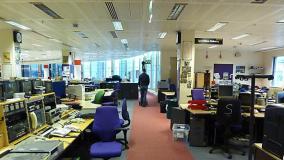 Lots of people have been taking photographs before we leave, to provide a final record of a building we’ve grown to love, but we’ve also decided to make a larger-scale memorial to the home of British television, so Google have brought their Street View cameras in to record large areas of the building as it is now, before it is redeveloped and refurbished.
Lots of people have been taking photographs before we leave, to provide a final record of a building we’ve grown to love, but we’ve also decided to make a larger-scale memorial to the home of British television, so Google have brought their Street View cameras in to record large areas of the building as it is now, before it is redeveloped and refurbished.As you can see from the picture, they have a special trolley on which the camera pod can be mounted, and this is carefully wheeled through much of the building, capturing the Foyer, the Stage Door with its renowned mural, the old scenery painting area, the studios and miles and miles of strangely similar corridor. Plus the newsroom, one or two offices and, we hope, the famous BBC canteen and its astonishing kitchens.
Studio S1, home of Today and PM for many years, is now an empty shell, and the sixth floor no longer reverberates to the sound of executive decision making, but it remains fascinating to walk through, either in real life or on a screen.
I think that anyone who wanders around the virtual corridors will get a sense of what life has been like for those of us who have worked there over the decades, and get a buzz from being allowed to look backstage in a building that has been so important to anyone who ever watched television.
The BBC’s archive is vast, but most people think of it in terms of a massive library of TV and radio programmes. In fact it’s much more than that – there are miles of paper documents, millions of photographs, vinyl LPs, sheet music and objects like the old BBC One globe and early cameras. Thanks to Google we’re now creating a "virtual tour" of the building that everyone can enjoy, and we’re also adding to the BBC’s store of memories.
In the Media:
- BBC TV Centre: Goodbye to the 'dream factory' (BBC News)
- BBC Television Centre: Farewell to the Dream Factory (The Independent)
- Farewell London W12 8QT (The Sun)
- The question mark over the BBC's finest hours (Express)
- A farewell to TVC (BBC)
- Angela Rippon revisits old TV studio [video] (BBC News)
- In praise of ... Television Centre (Guardian)
- Michael Grade: 'BBC Television Centre was state of the art but it's way past its sell-by date' (Independent)
- Television Centre sale draws fire from BBC stars in tribute programme (Guardian)
- BBC stars lament end of TV Centre (Express)
- Madness to play BBC Television Centre farewell gig (BBC)
- Dance on tap for final show from TV Centre (Brighouse Echo)
- BBC Club appoints Pitman’s People for The Television Centre’s Closing Party Celebrations (Event Industry News)
